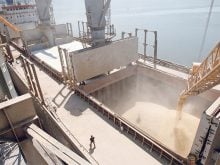The future is so bright for the canola crushing industry that light is flashing off the shiny new grain bins.
The confidence in the industry is based on more than just a few months’ strong profits, said Paul Brisebois, assistant vice-president of marketing for James Richardson International.
A combination of stable markets, a steady acreage base, interest in biofuels and a strong interest in the health benefits of canola are creating enthusiasm in the oilseed crop.
“There’s a lot of optimism about canola in general and the crushing industry. It’s evident by the investment people are making,” said Brisebois.
Read Also

Short rapeseed crop may put China in a bind
Industry thinks China’s rapeseed crop is way smaller than the official government estimate. The country’s canola imports will also be down, so there will be a lot of unmet demand.
JRI and Louis Dreyfus Canada have announced they will each build canola crushing plants near Yorkton, Sask.
“All crushers are expanding. Everybody is at capacity,” said Brisebois.
The Canadian Oilseed Processors Association reports the amount of canola crushed as of the end of November was 1.1 million tonnes, up from one million tonnes at the same time last year. The crushers are running at 90 percent capacity.
At times in the past, Canadian crushers have lost money on every tonne of canola crushed. As demand for canola oil increases, crusher margins have also improved enough for companies to make long-term commitments to build new plants.
The two new large crushers in the middle of the Prairies will create a more intense competitive environment for canola seed. One plant alone will require the seed from more than a million acres of canola.
Reports of canola’s health benefits coming from the United States may be one of the crop’s biggest strengths, said Brisebois.
As more health conscious consumers start reading the fine print on margarine and cooking oil labels, the demand for canola will increase and, in turn, the acres of canola on prairie farms will also rise.
Canola planting has dropped as low as nine million acres on the Prairies in the past. Brisebois estimates canola could rise to 16 to 18 million acres because of the increased demand for oil.
In turn, the larger acres will attract attention from large multinational companies, which could redirect some of their research and development money to canola from soybeans and corn.
“If it had a larger, more sustainable crop in canola, it becomes more interesting for research and development,” said Brisebois, whose parent company owns Canbra Foods, which has been crushing in Lethbridge since 1960.
“You will see a more solid, dependable canola market.”














